-
 bitcoin
bitcoin $87959.907984 USD
1.34% -
 ethereum
ethereum $2920.497338 USD
3.04% -
 tether
tether $0.999775 USD
0.00% -
 xrp
xrp $2.237324 USD
8.12% -
 bnb
bnb $860.243768 USD
0.90% -
 solana
solana $138.089498 USD
5.43% -
 usd-coin
usd-coin $0.999807 USD
0.01% -
 tron
tron $0.272801 USD
-1.53% -
 dogecoin
dogecoin $0.150904 USD
2.96% -
 cardano
cardano $0.421635 USD
1.97% -
 hyperliquid
hyperliquid $32.152445 USD
2.23% -
 bitcoin-cash
bitcoin-cash $533.301069 USD
-1.94% -
 chainlink
chainlink $12.953417 USD
2.68% -
 unus-sed-leo
unus-sed-leo $9.535951 USD
0.73% -
 zcash
zcash $521.483386 USD
-2.87%
Which is more cost-effective, OTC trading of USDT or buying it directly from an exchange?
The choice between OTC and exchange purchases of USDT depends on factors like fees, speed, privacy, and transaction size, each affecting cost-effectiveness differently.
Mar 30, 2025 at 02:15 pm
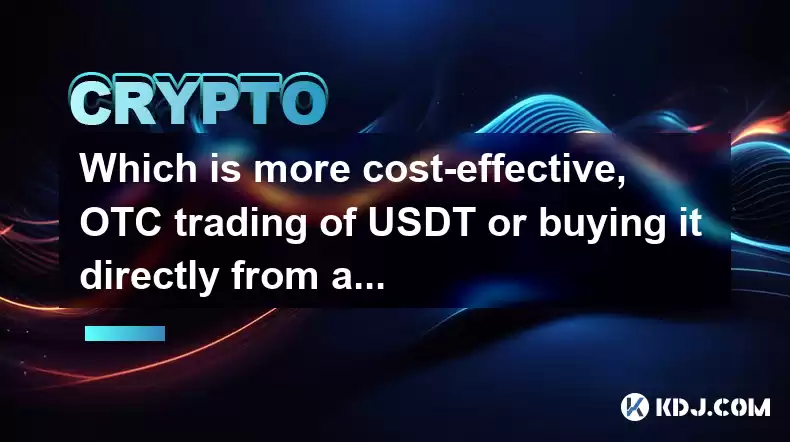
Understanding the Cost Dynamics of USDT Acquisition
The choice between over-the-counter (OTC) trading and direct exchange purchases for Tether (USDT) depends on several factors influencing overall cost-effectiveness. Both methods have their own sets of fees, transaction speeds, and limitations. Understanding these nuances is crucial for making an informed decision.
Directly buying USDT from a cryptocurrency exchange is generally a straightforward process. Most exchanges offer USDT pairs with various fiat currencies (like USD, EUR, etc.) or other cryptocurrencies. The cost here primarily involves trading fees, which vary significantly across platforms. These fees are usually a percentage of the transaction value. Additionally, some exchanges might have deposit or withdrawal fees for fiat currencies.
OTC trading, on the other hand, involves trading USDT directly with a counterparty, often a large institution or broker. This method usually bypasses public order books, providing a level of privacy and potentially larger transaction sizes. However, OTC trades often involve higher minimum transaction amounts and may have higher fees, especially for smaller trades. These fees are usually negotiated beforehand and can be structured differently than exchange fees.
Analyzing the Fees Involved in Each Method
Exchange fees are typically transparent and readily available on the exchange's website. They are usually charged as a maker/taker fee based on whether you are adding liquidity to the order book (maker) or taking liquidity from it (taker). The fees can range from 0.1% to 0.5% or even higher, depending on the exchange and your trading volume. Always check the specific fee schedule of your chosen exchange.
OTC trading fees are less transparent. They are usually negotiated between the buyer and seller and can include a percentage of the transaction value, a fixed fee, or a combination of both. Negotiating a favorable fee is crucial in OTC trading, particularly for large transactions. Hidden costs might also exist, such as intermediary fees or transfer charges.
Transaction Speed and Liquidity
Purchasing USDT directly from an exchange offers relatively fast transaction speeds. Once the order is placed and confirmed, the USDT is usually credited to your account within minutes, depending on the exchange's processing time and network congestion. Liquidity is generally high on major exchanges, enabling quick execution of trades, even for large orders.
OTC trading, while potentially offering higher transaction volumes, can be slower. The process involves finding a suitable counterparty, negotiating the terms, and completing the transaction, which can take anywhere from a few hours to several days. Liquidity might be less readily available compared to exchanges, especially for less common trading pairs. Time sensitivity is a crucial factor to consider.
Privacy and Security Considerations
Exchanges typically require KYC (Know Your Customer) and AML (Anti-Money Laundering) compliance, meaning you'll need to provide personal information. While this ensures security for the platform and its users, it compromises a degree of privacy. Your trading activity is recorded on the exchange's platform.
OTC trading often offers a higher degree of privacy. You may not be required to provide as much personal information to your counterparty, depending on the regulatory environment and the transaction size. However, choosing a reputable and trustworthy counterparty is essential to mitigate security risks in OTC trading. Thorough due diligence is required to ensure the counterparty is legitimate and reliable.
Minimum Transaction Amounts and Volume
Exchanges typically have no minimum transaction amounts, allowing users to buy even small quantities of USDT. This flexibility is beneficial for those with limited capital or those experimenting with cryptocurrency.
OTC trading usually involves higher minimum transaction amounts. This is because the process of negotiating and executing the trade is more resource-intensive for the counterparty. OTC is generally more suitable for high-volume transactions. For smaller amounts, the fees might outweigh the benefits.
Regulatory Compliance and Legal Aspects
Both exchange and OTC trading are subject to varying degrees of regulatory scrutiny. Exchanges are generally more heavily regulated, adhering to KYC/AML rules and other compliance requirements. The regulatory landscape for OTC trading can be more complex and varies significantly depending on jurisdiction. Understanding the legal implications of both methods in your region is crucial.
Choosing the Right Method: A Practical Approach
The most cost-effective method depends on your individual circumstances. For smaller transactions and a need for speed and transparency, direct exchange purchases are generally more efficient. For larger transactions, a higher degree of privacy, or the need to bypass public order books, OTC trading might be preferable, provided you can negotiate favorable fees and find a reliable counterparty.
Frequently Asked Questions
Q: Are there any hidden fees associated with OTC USDT trading?A: Yes, there can be hidden fees in OTC trading, such as intermediary fees or transfer charges. These are not always transparent upfront and should be clarified during negotiations.
Q: Which method offers better privacy?A: OTC trading generally offers better privacy than exchange trading, as it doesn't require the same level of KYC/AML compliance.
Q: Which method is faster?A: Exchange trading is significantly faster, with transactions usually completed within minutes. OTC trading can take hours or even days.
Q: What are the minimum transaction amounts for each method?A: Exchanges usually have no minimum, while OTC trading typically has significantly higher minimum transaction amounts.
Q: How do I find a reputable OTC counterparty?A: Finding a reputable OTC counterparty requires thorough research and due diligence. Look for established brokers with positive reviews and a proven track record. Consider referrals from trusted sources within the cryptocurrency community.
Q: Are there any tax implications to consider?A: Yes, both exchange and OTC trading of USDT have tax implications that vary depending on your location and the specific regulations in your jurisdiction. It's recommended to consult with a tax professional for guidance.
Disclaimer:info@kdj.com
The information provided is not trading advice. kdj.com does not assume any responsibility for any investments made based on the information provided in this article. Cryptocurrencies are highly volatile and it is highly recommended that you invest with caution after thorough research!
If you believe that the content used on this website infringes your copyright, please contact us immediately (info@kdj.com) and we will delete it promptly.
- Ripple, Banks, & Cash: The Digital Treasury Revolution and Washington's New Blueprint
- 2026-01-31 22:40:02
- Bitcoin's High-Wire Act: Leverage Ratio Spikes, Volatility Looms on the Horizon
- 2026-01-31 22:20:02
- Spur Protocol's SON Token: A Listing Saga and Its Murky Price Outlook
- 2026-01-31 22:15:04
- Bitcoin Price Breakdown Looms as Institutions Pull Billions: BTC Faces Critical Juncture
- 2026-01-31 22:10:07
- Tria Airdrop's Second Act: Season 2 Kicks Off, XP Details Unveiled
- 2026-01-31 22:05:08
- Silver Liquidation Raised Eyebrows: What Happened, and What It Means
- 2026-01-31 22:00:07
Related knowledge
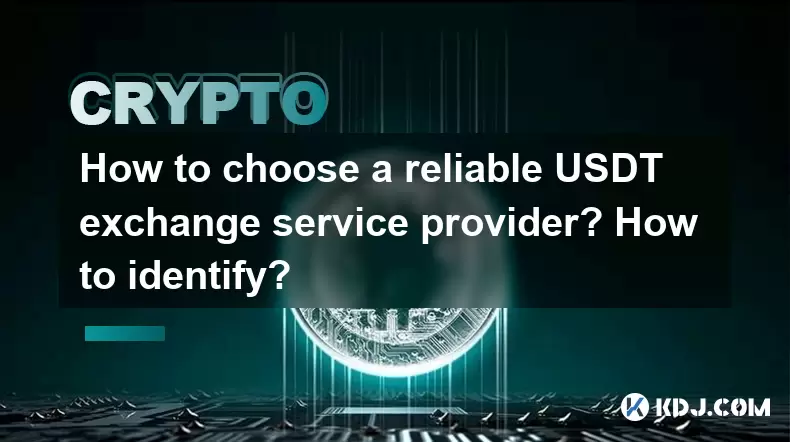
How to choose a reliable USDT exchange service provider? How to identify?
Jun 12,2025 at 03:15pm
Understanding the Role of USDT in Cryptocurrency TradingUSDT (Tether) is one of the most widely used stablecoins in the cryptocurrency market. It is d...
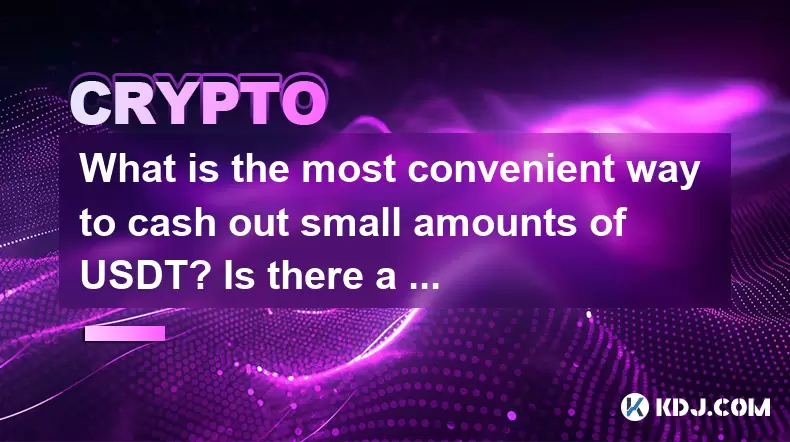
What is the most convenient way to cash out small amounts of USDT? Is there a shortcut?
Jun 11,2025 at 11:00pm
Understanding the Need to Cash Out Small USDT AmountsCashing out small amounts of USDT can be a challenge for many crypto users. Traditional methods o...
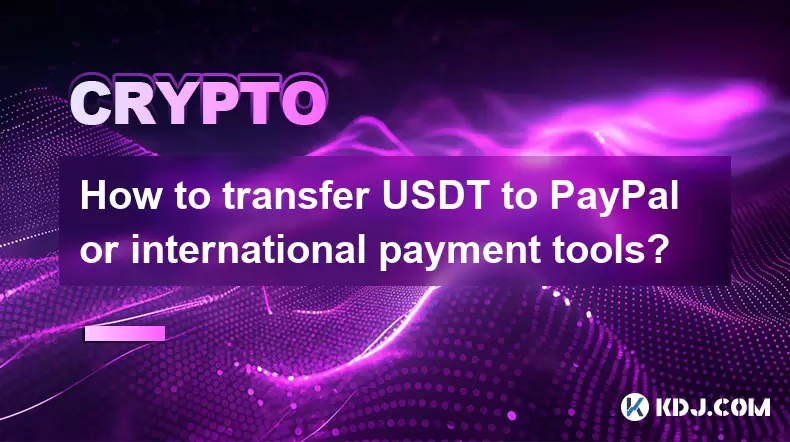
How to transfer USDT to PayPal or international payment tools?
Jun 15,2025 at 05:28am
Understanding the Basics of USDT and PayPal IntegrationUSDT (Tether) is a stablecoin pegged to the US dollar, offering blockchain-based value transfer...
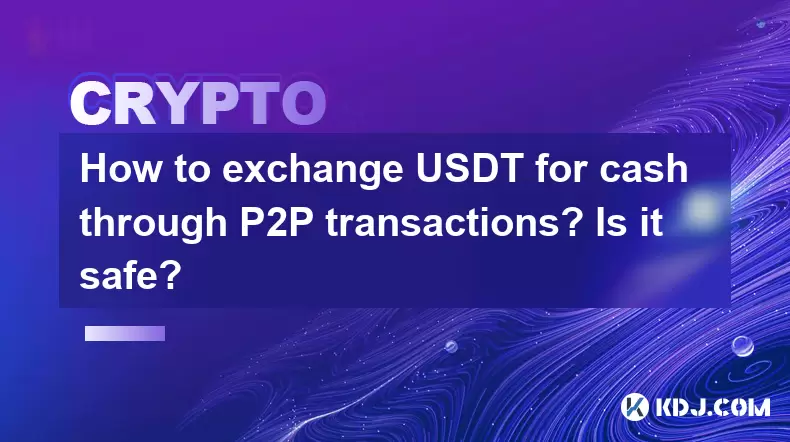
How to exchange USDT for cash through P2P transactions? Is it safe?
Jun 18,2025 at 07:56am
Understanding USDT and P2P TransactionsTether (USDT) is a stablecoin pegged to the value of the US dollar, making it a popular choice for users who wa...
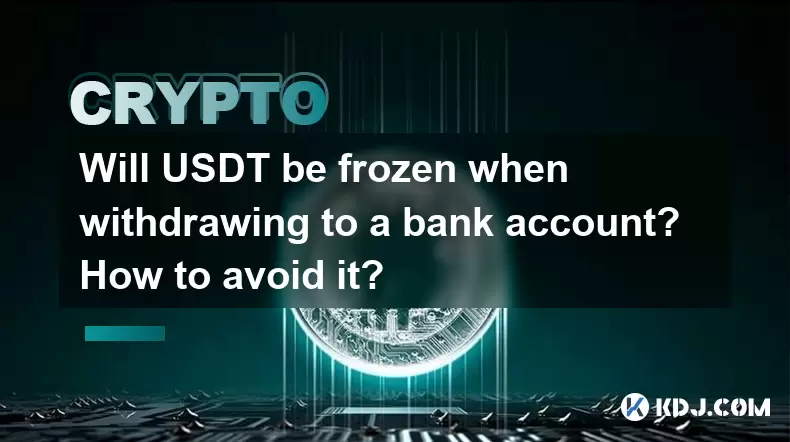
Will USDT be frozen when withdrawing to a bank account? How to avoid it?
Jun 15,2025 at 10:03am
Understanding USDT Withdrawals and Bank Account Freezing RisksWhen users decide to withdraw USDT (Tether) to a bank account, one of the most common co...
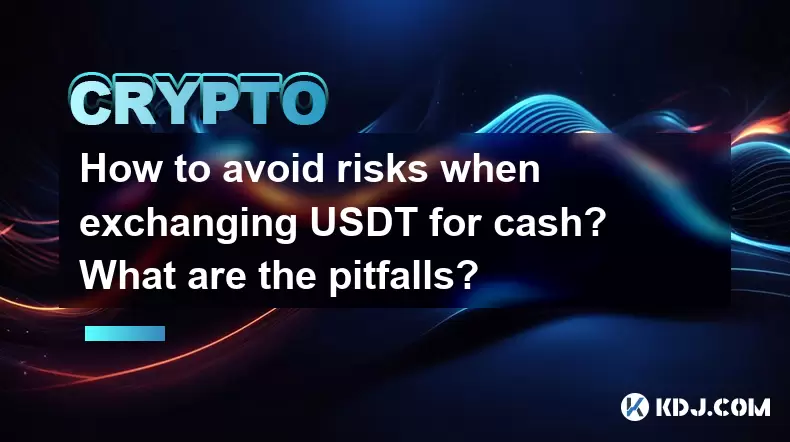
How to avoid risks when exchanging USDT for cash? What are the pitfalls?
Jun 11,2025 at 08:14pm
Understanding the Risks of Exchanging USDT for CashWhen exchanging USDT (Tether) for cash, users must be aware of the potential risks involved. As a s...

How to choose a reliable USDT exchange service provider? How to identify?
Jun 12,2025 at 03:15pm
Understanding the Role of USDT in Cryptocurrency TradingUSDT (Tether) is one of the most widely used stablecoins in the cryptocurrency market. It is d...

What is the most convenient way to cash out small amounts of USDT? Is there a shortcut?
Jun 11,2025 at 11:00pm
Understanding the Need to Cash Out Small USDT AmountsCashing out small amounts of USDT can be a challenge for many crypto users. Traditional methods o...

How to transfer USDT to PayPal or international payment tools?
Jun 15,2025 at 05:28am
Understanding the Basics of USDT and PayPal IntegrationUSDT (Tether) is a stablecoin pegged to the US dollar, offering blockchain-based value transfer...

How to exchange USDT for cash through P2P transactions? Is it safe?
Jun 18,2025 at 07:56am
Understanding USDT and P2P TransactionsTether (USDT) is a stablecoin pegged to the value of the US dollar, making it a popular choice for users who wa...

Will USDT be frozen when withdrawing to a bank account? How to avoid it?
Jun 15,2025 at 10:03am
Understanding USDT Withdrawals and Bank Account Freezing RisksWhen users decide to withdraw USDT (Tether) to a bank account, one of the most common co...

How to avoid risks when exchanging USDT for cash? What are the pitfalls?
Jun 11,2025 at 08:14pm
Understanding the Risks of Exchanging USDT for CashWhen exchanging USDT (Tether) for cash, users must be aware of the potential risks involved. As a s...
See all articles





















![Ultra Paracosm by IlIRuLaSIlI [3 coin] | Easy demon | Geometry dash Ultra Paracosm by IlIRuLaSIlI [3 coin] | Easy demon | Geometry dash](/uploads/2026/01/31/cryptocurrencies-news/videos/origin_697d592372464_image_500_375.webp)




















































